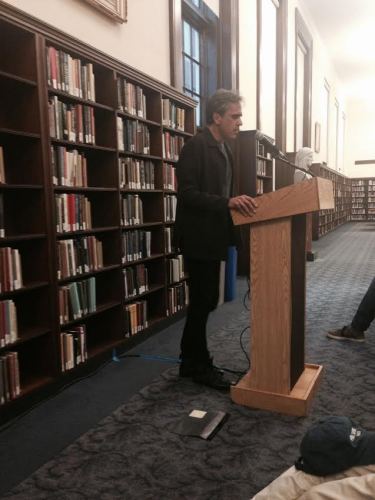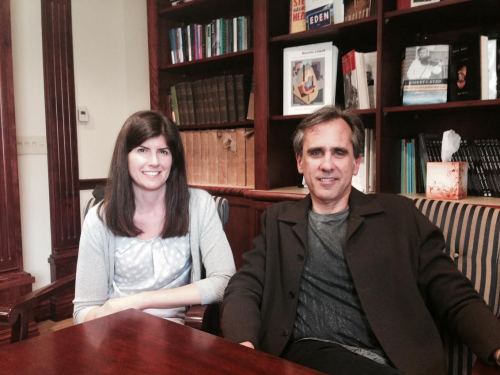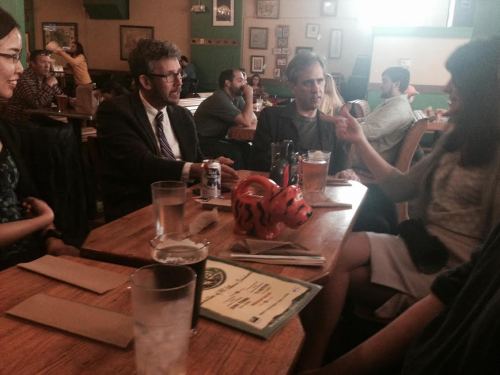Poet James Longenbach Visits Colson Hall

James Longenbach reading
Poet James Longenbach is no stranger to WVU MFA candidates. In the past three years, MFA poets have studied four of his books: the critical prose of The Art of the Poetic Line, The Virtues of Poetry, and The Resistance to Poetry, and the poems in his collection The Iron Key. The opportunity to meet the person behind these texts was cause for excitement. As third-year MFA Patric Nuttall said, “It was great to meet the author of these books we’ve been reading and discussing the last few semesters.” And Longenbach truly rose to the occasion with his visit to Colson Hall.
On April 16th, the day-long festivities began with an afternoon lecture on the lyric poem. Titled “Lyric Knowledge,” Longenbach discussed how form and syntax uphold and subvert expectations to create a pleasurable reading experience. His talk not only considered why we are gratified by familiar patterns, but why we feel we will be relieved by unfamiliar patterns. “We re-read and re-listen,” Jim said, “because of structure, not information.” As evidence for his argument, Longenbach presented various lyric poems with their lines reversed. Read as originally intended, the sun in Wallace Stevens’ “No Possum, No Sop, No Taters” feels like a familiar hope. Read reversed, it becomes a wish or a dream. Asking the audience to experience poems like Stevens’ this new way reinforced the vitality of their original structures.

Mary Ann Samyn and James Longenbach
After the lecture, Longenbach visited the graduate poetry workshop. He fielded questions from the MFA poets about writing, reading, teaching, and what he does in his downtime. “I cannot will myself to write a poem, but I can will myself to write prose,” he said, when asked about his writing processes. But for Longenbach, writing prose is not unlike writing poetry. “We read critics because their essays are beautiful things.” He distinguished reading from writing further, as he said, “Your own poems, you write them to get rid of them. You read what you want to keep. You write what you want to throw away.” Perhaps the most important piece of advice Longenbach imparted was on patience. “Do anything you can do to make yourself not be impatient,” he advised. “Be less anxious.” For himself, being less anxious involves activities outside the literary world, such as learning the lute and watching bad television. But when it’s time for poetry, Longenbach approaches with rigor. He emphasized, “I do not know any poet of achievement that does not think so rigorously about poetry.”
For dinner, Longenbach joined MFA poets and faculty for dinner at Black Bear Burritos downtown, where we all chatted more about our lives and bad T.V. shows. First-year MFA Sarah Munroe said, “We’ve read so many of his books in poetry workshops, it was great to be able to see him in the flesh and hear him speak. When he answered questions in workshop he told us that we’re all servants of poetry, of the poets who will be remembered, if this is the work we choose. A humbling but helpful reminder. It’s also nice to know that someone as well read as he is has guilty T.V. pleasures too, like Gossip Girl.”

Graduate students and faculty with James Longenbach at Black Bear
The night concluded with a reading in the downtown library’s Robinson Reading Room. Longenbach read poems from his forthcoming book Earthling, titled for the archaic definition: one who works the earth. The poems ranged in subject from horse rides, to losing a dog, and a crocodile’s perspective.
April 16th was a full and fulfilling day. Like his writing, James Longenbach gave us much to remember and much to keep.
James Longenbach is a poet and a critic whose most recent collection of poems, The Iron Key, is a meditation on the conditions and consequences of beauty. One of his recent critical works, The Art of the Poetic Line, is an account of the work of lineation in free-verse, syllabic, and metered poetry (ranging from Shakespeare to Ashbery). He has also written widely about modern and postmodern poetry, sometimes emphasizing the historicity of poetic language (Wallace Stevens: The Plain Sense of Things) but also exploring the ways in which poems resist their historical situation (The Resistance to Poetry).

 Feed
Feed
Comments disabled
Comments have been disabled for this article.